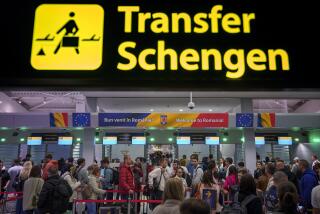‘Yugoslavia’ Fades Into Name History
- Share via
BELGRADE, Serbia and Montenegro — Erasing Yugoslavia from the map of Europe, lawmakers all but dissolved the troubled Balkan federation Tuesday and gave birth to a new country with a new name: Serbia and Montenegro.
Under a European Union-brokered accord approved by the Yugoslav parliament, the two republics will stick together in a loose union that gives each greater autonomy. They will remain tied only by a small joint administration in charge of defense, foreign affairs and general economic planning.
Lasting links, however, are not guaranteed: The accord allows each member state to hold an independence referendum after three years.
The deal is a compromise amid conflicting demands within both republics that Serbia and Montenegro be firmly tied or completely separated.
“This is a new beginning, but we should not be euphoric,” Serbian Prime Minister Zoran Djindjic said. “This new country is based on a minimum of common interest between Serbia and Montenegro, and we should give it a chance.”
Yugoslavia, founded in 1918 as the Kingdom of Serbs, Croats and Slovenes, comprised six republics until the early 1990s, when Slobodan Milosevic presided over a breakup that saw Bosnia-Herzegovina, Croatia, Macedonia and Slovenia secede.
Serbia and Montenegro opted to stay together. But relations between the republics soured, prompting the EU to mediate the accord last year in an effort to prevent more upheaval.
The nation’s new charter comes into force immediately, but it is expected to take about a month for the country’s institutions to be set up. They include a 126-member parliament, which will pick a president.
“A new state may have been born, but the citizens of Serbia and Montenegro still have no flag, national anthem or coat of arms,” said B-92 radio.
In many ways, the marriage remains awkward. Montenegro, which has just 650,000 people, is dwarfed by Serbia, home to 10 million. Serbia’s official currency remains the dinar, but Montenegro uses the euro. The national army will remain intact.
The news was received with indifference here.
“Twelve years ago, if you asked me, I would say I was a Yugoslav,” said Dragan Djilas, 35, an advertising executive. “I was surprised that it fell apart so quickly. Now I’ve taken the Serb option. I’m Serb. This new country is a stupid thing.”
More to Read
Sign up for Essential California
The most important California stories and recommendations in your inbox every morning.
You may occasionally receive promotional content from the Los Angeles Times.













